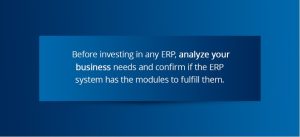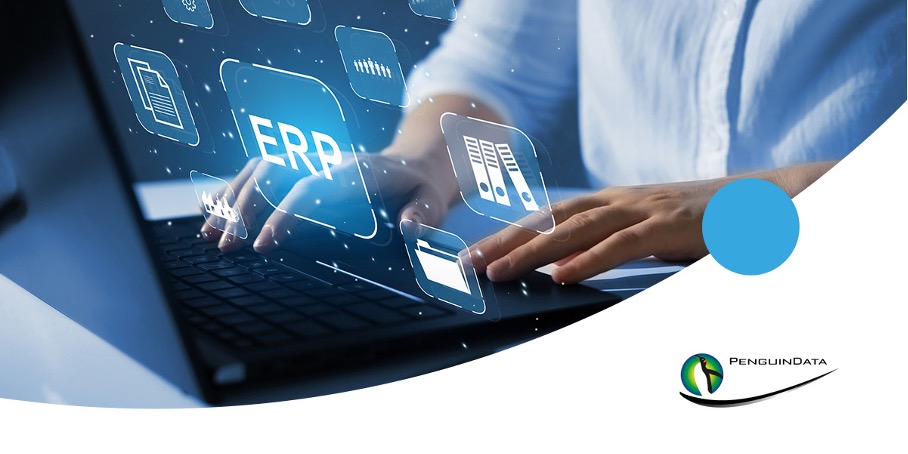
Choosing the Right Cloud ERP System
Enterprise resource planning (ERP) systems have become integral to business operations. From enhancing efficiency to streamlining operations, these tools can boost business growth. Most companies implement ERP systems to support growth and replace outdated systems for greater functionality.
Cloud-based ERP solutions are becoming popular across all industries. According to the 2022 ERP Report by Software Path, almost 97% of companies are considering cloud-based solutions. With many ERP systems in the market, how do you know which one is right for your business? We’ll explore crucial factors to consider when selecting the right cloud ERP system for your company or business.
Overview of ERP Systems
To fully understand an ERP system or software, consider all the core business operations or processes required to keep the company running. These processes include human resource management, supply chain operations and procurement. An ERP system helps you manage all these processes in a single integrated system. The system ties many business processes and enables the exchange or flow of data between them.
ERP software gives businesses the intelligence, automation and interrogation essential to run operations efficiently. These systems bring the following benefits to workforce management and overall operations:
- Deeper insights: These systems provide a single source of truth. It’s also easy to share reports and results. Employees can work on insights and improve performance in real time.
- Increased productivity: You can streamline and automate core business processes to help employees do more with fewer resources.
- Lower risks: Ensure compliance with regulatory requirements and maximize business visibility.
Understanding Cloud ERP
ERP can be run on-premise or on a cloud platform. Traditional ERP systems are stored and managed locally on a company’s servers. Cloud ERP software runs on a cloud-computing infrastructure. Cloud solutions allow you to access the ERP system over the internet. Your provider hosts the ERP on a cloud computing platform, and it’s delivered as a Software-as-a-Serrvice (SaaS).
Cloud ERP has the following benefits:
- Scalability: Operations can be scaled easily without the need to add more servers for more users or locations.
- Flexibility: You can customize the ERP to fit your business needs. Cloud ERP systems also tend to integrate well with other cloud-based products.
- Cost effectiveness: On-premise ERP requires users to purchase servers and employ IT staff to manage the system. Cloud ERP doesn’t require on-premise servers or IT staff because the vendor hosts and manages the software.
- Better security: Cloud vendors offer end-to-end encryption of data and enterprise-grade security on the platforms.
- Enhanced accessibility and collaboration: You can access cloud ERP software from anywhere and on any device.
- Rapid deployment: Cloud solutions allow businesses to get up and running faster than on-premise ERPs. There is no requirement to set up hardware or train IT staff before starting implementation.
- Automatic updates: The vendor handles software updates, system maintenance and security patches, ensuring your company always has access to the latest features and enhancements.
Identifying Business Needs for an ERP System

A typical ERP system has several modules or functionalities to help you implement specific operations. For example, the HR module is designed for personnel management. Meanwhile, the finance module helps you execute various financial tasks, such as managing account receivables. Before investing in any ERP, analyze your business needs and confirm if the ERP system has the modules to fulfill them. The right ERP system has all the features you’re looking for and aligns with your business objectives.
Start by understanding your company’s key business processes. These operations are the backbone of the business. They may include project management, finances, sales and marketing, supply chain and logistics, human resources or customer relationship management. Understand the steps involved in the business processes, and visualize a workflow between different departments. Identify any bottlenecks in the processes and analyze the impact of these inefficient processes on the business.
You should then define your company or business objectives. The ERP modules or functionalities should align with these objectives. You should also define what the business desires to achieve from implementing the cloud ERP solution. For example, you may be seeking enhanced collaboration and data sharing between departments and business locations.
Engage key stakeholders who will be affected by the ERP software’s implementation. These stakeholders have important insights into business operations that can help determine the right ERP system.
Key Features to Look for in an ERP System
Choosing the right ERP software for your business can be overwhelming when there are many options. Look for the following key features when selecting an ERP system for your business:
- Core functionalities: Ensure that the system has all the core functionalities you identified when analyzing your company’s key business processes. Choosing a system with all the modules eliminates the need to invest in additional systems or software to perform other tasks that the ERP cannot accommodate.
- User-friendly interface: The system should be easy to use for all employees at all levels. A simple user interface, responsive design and intuitive navigation can reduce the learning curve. A user-friendly platform also reduces the onboarding time for new users.
- Integration capabilities: Look for an ERP software that seamlessly integrates with your existing software applications, such as HRM and CRM. The integration enables better collaboration and communication across departments. A good ERP should also be capable of integrating with external systems or third-party applications.
- Mobile accessibility: Look for cloud-based ERP systems that have mobile accessibility, allowing you and the company’s employees to access critical information and perform tasks from anywhere.
- Automation and artificial intelligence: A modern ERP system should have capabilities to leverage AI to streamline processes, optimize resource allocation and automate routine tasks. Look for systems that have features like predictive analytics, intelligent inventory management and machine learning algorithms that provide recommendations and valuable insights.
Evaluating Potential Cloud ERP Providers
Engaging the right vendor ensures you have a partner that takes care of your ERP system from the backend, giving you peace of mind. While evaluating potential ERP providers, consider the following factors:
- Reputation and support: Choose solution providers with a good reputation in the industry. Ensure they have reliable customer support services.
- Costs: Asses the cost of ownership versus the value provided by the vendor.
- Data privacy and backup: Confirm they have strong data privacy measures and reliable data backup solutions.
- Security and compliance: Ensure the system they’re trying to sell you meets industry-specific security and compliance standards.
Get Cloud ERP Solutions From PenguinData
The right ERP solution can take your business to the next level. Integrate your core business processes into one single platform that unifies the data and improves collaboration across teams.
A cloud ERP system makes it easy to scale operations, and it’s accessible from anywhere on different devices. At PenguinData, we have user-friendly solutions to help you streamline your business processes. Our product, PenguinData Workforce Management, will help you manage all your integrated data. Request a free demo today.

Linked Sources
- https://softwarepath.com/guides/erp-report
- https://www.penguindata.com/workforce-management/modules/workforce-management.aspx
- https://www.penguindata.com/human-resources/
- https://www.penguindata.com/workforce-management/modules/mobile-workforce-management-software.aspx
- https://www.penguindata.com/why-penguindata/
- https://www.penguindata.com/demo/request-webinar-marketing.aspx
